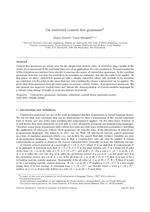On restricted context-free grammars
From International Center for Computational Logic
On restricted context-free grammars
Jürgen DassowJürgen Dassow, Tomáš MasopustTomáš Masopust
Jürgen Dassow, Tomáš Masopust
On restricted context-free grammars
Journal of Computer and System Sciences, 78(1):293–304, 2012
On restricted context-free grammars
Journal of Computer and System Sciences, 78(1):293–304, 2012
- KurzfassungAbstract
Context-free grammars are widely used for the simple form of their rules. A derivation step consists of the choice of a nonterminal of the sentential form and of an application of a rule rewriting it. Several regulations of the derivation process have been studied to increase the power of context-free grammars. In the resulting grammars, however, not only the symbols to be rewritten are restricted, but also the rules to be applied. In this paper, we study context-free grammars with a simpler restriction where only symbols to be rewritten are restricted, not the rules, in the sense that any rule rewriting the chosen nonterminal can be applied. We prove that these grammars have the same power as random context, matrix, or programmed grammars. We also present two improved normal forms and discuss the characterization of context-sensitive languages by a variant using strings of length at most two instead of symbols. - Forschungsgruppe:Research Group: Wissensbasierte SystemeKnowledge-Based Systems
@article{DM2012,
author = {J{\"{u}}rgen Dassow and Tom{\'{a}}{\v{s}} Masopust},
title = {On restricted context-free grammars},
journal = {Journal of Computer and System Sciences},
volume = {78},
number = {1},
year = {2012},
pages = {293{\textendash}304},
doi = {10.1016/j.jcss.2011.05.008}
}
